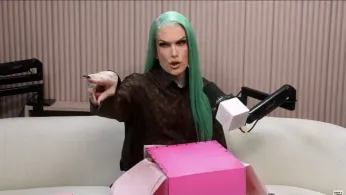
3 hours ago
Jeffree Star’s 'Not Gay' Controversy: Appearance on 'Skinny Confidential' Draws Backlash for Anti-Trans Remarks
READ TIME: 4 MIN.
Jeffree Star, known internationally for his bold makeup artistry, YouTube fame, and high-profile controversies, has once again become a focal point of LGBTQ+ discourse following his recent appearance on "The Skinny Confidential" podcast. The episode, released amid Trans Awareness Week, quickly ignited a firestorm of discussion and condemnation within LGBTQ+ communities and the broader public .
During the podcast, Star articulated his view that he is “not gay, ” stating, “I’m just open and very me.” He went further, arguing that the LGBTQ+ acronym should exclude the “Q” and “T”, insisting, “LGB, that is your preference for what you are attracted to and what you like. Your identity issues and who you think you are is so separate. I don’t agree that they should be together” . This statement was made in the context of a broader critique of nonbinary and transgender identities.
Star’s comments on the podcast did not occur in isolation. He has a documented history of voicing skepticism toward nonbinary identities, previously referring to nonbinary pronouns as “they and them bullshit” and asserting that these concepts were “made up during the pandemic because people were bored in their houses” . On one podcast, he reiterated these views, saying, “You’re not ‘they’ and ‘them, ’ you’re trans, you’re male, or you’re female” .
He also expressed strong opposition to gender-affirming care for minors and questioned the role of parents who support their transgender children, asking, “Why are we encouraging our kids to be a different gender and feed them false information when they’re so young? ” . Star further claimed that his own mother, when he experimented with makeup and femininity as a child, simply encouraged him to be himself, implying that contemporary approaches to supporting transgender youth are misguided .
Star’s remarks have provoked significant backlash. Many social media users and LGBTQ+ advocates condemned his statements as transphobic and harmful, especially given their timing during Trans Awareness Week—a period dedicated to celebrating and supporting transgender people .
In particular, critics highlight that Star’s platform reaches millions of followers, amplifying rhetoric that dismisses the lived experiences and identities of nonbinary and transgender individuals. Comments under podcast clips and social posts have ranged from urging others not to listen to Star to more pointed critiques of his repeated history of invalidating nonbinary and trans identities .
Some supporters of Star, however, have praised his outspokenness and “sanity, ” echoing anti-trans sentiments in their praise. Notably, Star himself has claimed to have “common ground” with supporters of former President Donald Trump, stating, “Anyone with common sense can see that all I do is tell the truth. They love me ‘cause I’m real” .
Star’s podcast appearance and subsequent online comments align with a broader wave of anti-trans rhetoric in the United States. As documented by GLAAD, anti-LGBTQ+ and specifically anti-trans incidents have risen sharply in the past year, with 932 recorded hate-fueled incidents targeting LGBTQ+ people—half of which were directed at trans individuals . This surge in hostility is mirrored in political actions, with recent moves by public figures and government officials aimed at rolling back transgender rights and visibility .
Star’s defense of right-wing commentator Charlie Kirk, who was recently killed in Utah and known for anti-LGBTQ+ rhetoric, further situates his comments within this political context. On a TikTok livestream, Star stated, “Thank god, if you believe in they/thems, you’re a part of the problem, ” and defended Kirk’s legacy, saying, “Charlie Kirk fought for the truth, he debated everybody, and you guys cannot argue that. You are delusional and mentally ill if you go against what I just said. I didn’t share my opinion, I shared facts” .
Many LGBTQ+ advocates and organizations have responded by reaffirming the importance of recognizing and respecting all gender identities, including nonbinary and transgender people. The Trevor Project, for example, reports that 35% of Gen Z know someone who uses gender-neutral pronouns, underscoring the real and growing visibility of nonbinary identities .
Experts and advocacy groups have also emphasized the necessity of supporting trans and nonbinary youth, pointing to research that shows affirming care and environments reduce rates of depression, anxiety, and suicide among LGBTQ+ young people . Many have condemned Star’s rhetoric as not only factually incorrect, but also dangerous in its potential to inspire further stigma and violence against transgender communities.
The controversy surrounding Jeffree Star’s statements raises enduring questions about the role and responsibility of influencers and public figures in shaping conversations about LGBTQ+ identities. While Star insists he is “just open and very me, ” critics argue that such a platform comes with the obligation to speak accurately and compassionately about marginalized groups .
As the conversation continues, LGBTQ+ organizations are calling for listeners to seek out information from credible, community-led sources and to approach public discourse with empathy and respect for all identities.
Jeffree Star’s recent appearance on The Skinny Confidential podcast, and his accompanying statements about gender and sexuality, have reignited debate over the intersection of celebrity influence, LGBTQ+ rights, and the responsibilities of public figures. As LGBTQ+ advocates work to counter misinformation and promote affirmation for all identities, the incident serves as a reminder of the ongoing challenges faced by transgender and nonbinary people—and the importance of continued visibility and support.






